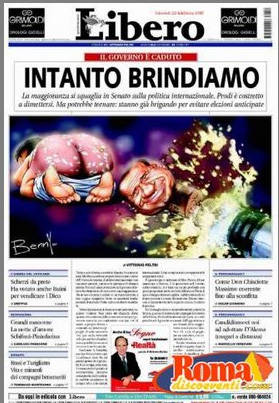Schadenfreude Italiano
After all this fuss a few weeks ago about how Ian Fisher of The New York Times was making Italy look bad (faceva fare una mala figura all'Italia), Italy did it all by itself (da sola). The Germans have the word Schadenfreude to describe the malicious pleasure one enjoys when they see someone else fail. Come si dice in italiano Schadenfreude? There certainly must be a cognate, as it seems to be a favorite Italian pastime.
Almost every evening at 7:30, I watch RAI Television News (Telegiornale) on Channel 63. It is there that I witnessed the spectacle in the Italian Senate as the 20 month-old, allegedly Center-Left, government of Romano Prodi disintegerated amid pushing, shoving, shouting, spitting, cursing, and the uncorking of what looked like Asti Spumonti bottles that overflowed during the political orgasm (orgasmo politico). It was brought about by the pique (picca) of a minor party Minister of Justice, Clemente Mastella, who resigned and then vented his anger by withdrawing his party's support in the Senate because his wife was being investigated for corruption. The final tally was 161-156.
It is said that "nature abhors a vacuum" (la natura aborre il vuoto). Perhaps because of its tragic historical experience with them, Italians abhor strong majorities. It is certainly difficult to have a national leader, no less a Dictator, if no one is allowed to speak for anyone else. Absolute autonomy is the preferred antidote to Fascism (Fascismo) of left and right. It is also the alluring charm of Italy - chaos (caos). It also explains why Prodi had an easier, and much more successful, tenure leading the European Union than he did Italy (twice-due volte). Over the decades I have read many versions of the story of Italy as Alice's Wonderland (paese delle meraviglie) by the likes of Edward Banfield, Carlo Levi, Luigi Barzini, Gaetano Salvemeni, Antonio Gramsci, and Alexander Stile, and many others. Some thought the backwardness (arretratezza) was limited to the lower classes. Others to the South (il Mezzogiorno)... but of course it runs from top to botom and north to south. For example, many Italian business owners abhor large (especially multinational) corporations who they fear (hanno paura di) will take over a whole industry and reduce Italians to mere little fish in a much bigger bowl.
This adversion to cooperation, and to the good of the whole over its individual parts (Comunità), obviously came over with Columbus to America. Ironically, America is the place where the Children of Columbus are recognized leaders in almost every aspect of American life; especially as to major American businesses and financial organizations (Iacocca, Bartiromo, Grasso, et cetera.). Yet, for better and for worst, Italian American organizations themselves don't rule. One brief example must suffice here. I may have mentioned somewhere that some three decades ago I was at the founding of American Italian Coalition of Organizations in New York City. A number of us (piu o meno promenenti) had gathered to deal with a crisis of social services to a needy segment of the large Italian American community in the Big Apple (la Grande Mela). My position as a Board member and experience as a community organizer brought me into close contact with dozens of Italian and Italian American groups. One such was a marvelous "Federation" of organizations (clubs) representing more and less recent immigrants organized around the towns, and regions in Italy from which they regularly came and went.
My good friend, and one-time President of both the Federation and Coalition, Mario DiSanto often took me to meetings of all the individual clubs, but it was the larger gatherings when all the groups sat around a set of tables that was most instructive as to Italian-style organizations (organizzazioni all'italiana). The official language of the meetings was English; which suited me very well as my facility with Italian was almost nothing (quasi-niente). I was introduced, spoke, and was addressed by the assembled members in English. However, when the group representatives didn't want me to know what was going on, they spoke to each other in Italian. When they didn't want the other clubs to understand, they whispered amongst themselves in their own dialects.
According to Jeff Israely in his "How An Italian Government Falls (Time Magazine: 1/24/08): "Most expect that the next showdown at the polls will feature Berlusconi and Rome Mayor Walter Veltroni, who was Prodi's No. 2 back in 1996-98 administration but is no longer close in the same camp. There are reports that Prodi will team up with small parties from the far left to try to stave off Veltroni's rise, which would no doubt bring on more nasty infighting. Many believe that a caretaker government made up of moderates from both center-left and center-right is necessary to bring about the reform necessary to bring more stability to the political system. Such an interim affair would probably turn out to be arcane, and painfully boring. That may be just what the country needs."






































i-Italy
Facebook
Google+
This work may not be reproduced, in whole or in part, without prior written permission.
Questo lavoro non può essere riprodotto, in tutto o in parte, senza permesso scritto.